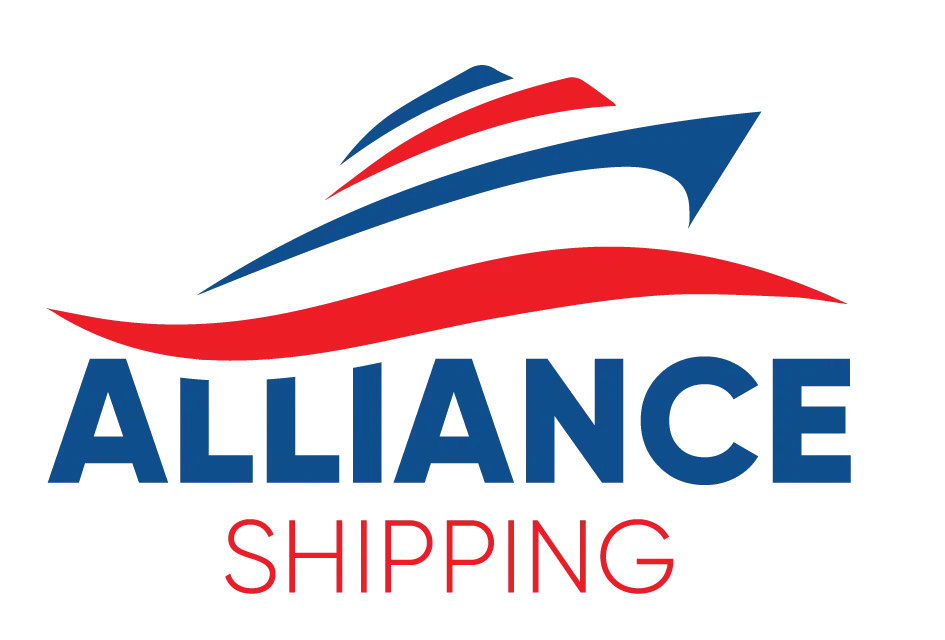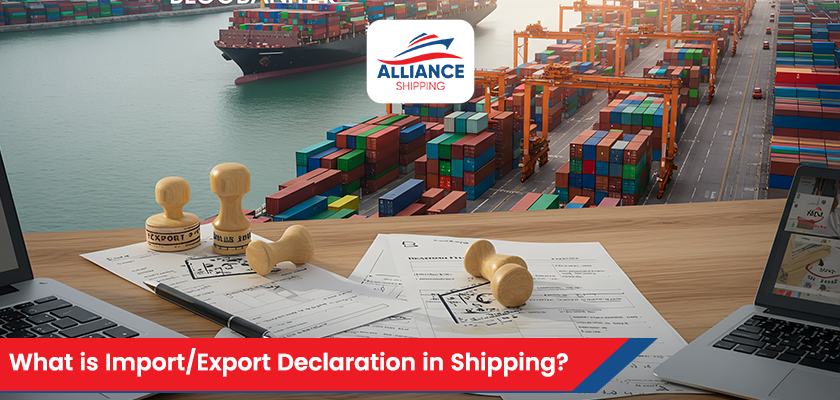An Import/Export Declaration is a mandatory government document that provides information about the cargo/goods shipment across international borders. It plays a vital role in ensuring legal, safe, and compliant international trade. If you are planning to import raw materials or export your products, you need respective import/export declaration and submit it to customs authorities.
The declaration is prepared and submitted by exporters and importers to ensure that the trade regulations were fulfilled,security checks and customs were satisfied. It assists authorities in determining responsibilities, and countering unlawful trade and in upholding correct trade figures. Companies have traditionally made declarations on a physical paper document but with the use and release of electronic filing systems (e-declarations) many countries now find the process more accurate, quicker and accessible. Let’s dive deeper into the fundamentals of Import/Export declaration, its significance and uses.
Fundamentals of import/export Declaration
An import/export declaration includes several key details that customs officials use to process and clear shipments. Here’s what it typically contains:
- Parties Involved
-
- Exporter’s Information
- Name of the exporter (shipper)
- Business address
- Tax Identification Number or Exporter Code
- Exporter’s Information
-
- Importer’s Information
- Name of the importer (consignee)
- Contact details (email, phone number)
- Importer registration or license number
- Importer’s Information
- Product and Shipment Details
-
- Product Description
- Type of goods being shipped
- Harmonized System (HS) code
- Total weight and quantity
- Declared value of the goods
- Product Description
-
- Origin and Destination
- Country of manufacture or origin
- Final destination country or delivery location
- Origin and Destination
-
- Transport Details
- Mode of transport (Air, Sea, Land, Rail)
- Name of the carrier (airline, shipping line, etc.)
- Route of shipment and transit points
- Transport Details
- Financial Information
- Invoice & Payment Information
- Total commercial value of the goods
- Currency of transaction
- Terms of sale (e.g., FOB, CIF, EXW)
- Invoice & Payment Information
- Authorization and Compliance
- Signatures/Approval
- Signature or digital authorization by the exporter or importer
- Approval by customs broker or authorized agent (if applicable)
- Signatures/Approval
What is Import Declaration?
Import Declaration refers to a formal document used by the importer to customs authorities prior to goods entering into a country. This statement has very elaborate contents regarding the imported goods like they have stated their source, duty, destination as well as the worth of the goods. It helps customs identify any duties and taxes that must be paid, investigate any of the restrictions or bans available on importation and to make sure that the products conform to national law.
Import Declarations can also be crucial in the compilation of the true record of trade which is useful in the monitoring of the economic activity by the government and enforcement of the trade policies. A right and up to date import declaration is important hence to prevent delay, payment of fines or holding of goods at the point of entry.
Key purposes of Import Declaration:
- Filed by the importer before goods enter the country
- Used to assess duties and taxes
- Helps verify compliance with import restrictions and regulations
- Supports the collection of trade data and statistics
What is Export Declaration?
Export Declaration is a required document that the exporter should submit before the goods are exported. It has essential information on the cargo delivery including where it is going, its worth and classification under Harmonized System (HS). The key use of this document is the ability of the customs authorities to be able to regulate outbound shipments, exercise export controls and also collect export statistics.
Filing an export declaration ensures the exporter abides by the laws of trade and any agreements made at the international level and thus the goods are now exportable. It is also beneficial to governments who keep track of sensitive or high-value cargo and use it to make national export reports.
Key purposes of Export Declaration:
- Filed by the exporter before goods leave the country
- Used to control and monitor exports
- Ensures compliance with export laws and international agreements
- Helps in collecting national trade and export statistics
The Importance of Import/Export Declaration
Import/export entry is an important part of the international trade as it acts as the formal documentation necessary to clear customs. In the absence of such declarations, goods do not move freely across borders and this may cause delays, imposition of fines or attachment of consignments. They present vital information allowing the customs authorities to evaluate and estimate the right duties and taxes according to the classification, the origin, and the price of the goods.
This process will make sure that all financial requirements are fulfilled before trading is done out or into a country. Further, statements affirm that the shipments do not violate international trade regulations, such as quotas, embargos, and sanctions, and assist businesses to avoid expensive legal problems and ensure compliance with regulatory agencies.
Import/export declarations have a significant role to play in the economic and security aspects of a country beyond the aspects of law and finance. The governments depend on the information gathered by use of these declarations to give accurate trade statistics and this uses the formulation of national economic policy and bilateral trade agreements. They are also important in matters of national security, in aiding the government to detect and ensure that illegal/dangerous/restricted goods do not move around the country.
In addition, these statements facilitate the movement of money based transactions in foreign trade like processing credit duties, insurance claims and paying of monies by means of supplying verified records of commodities under transit. Basically, import/export declarations are the core of transparent, secure and efficient trading globally.
Where is the Import/Export Declaration Used?
Import/Export Declarations are essential documents used across various sectors involved in international trade. They serve as official records that detail the type, value, and origin/destination of goods being traded. These declarations are not only vital for ensuring legal compliance but also play a key role in facilitating smooth and secure transactions. Different stakeholders rely on these documents for regulatory, financial, and logistical purposes.
Here’s where import/export Declarations are used:
- Customs Authorities – To regulate, inspect, and approve cross-border shipments.
- Exporters & Importers – To demonstrate compliance and ensure seamless trade operations.
- Freight Forwarders & Customs Brokers – To file declarations on behalf of clients and manage logistics.
- Banks & Insurance Companies – As part of trade finance processes and to assess risks.
- Government Agencies – To track trade data, enforce trade policies, and monitor economic activity.
How to File an import/export Declaration?
- Prepare Documents: Collect the commercial invoice, packing list, certificates, and contracts.
- Classify Goods: Assign the correct HS code and declare the accurate value.
- Submit Declaration: File the declaration via the customs portal or a licensed broker.
- Customs Review: Authorities verify documents, compliance, and assess duties.
- Approval & Clearance: Once approved, goods are cleared for shipment or receipt.
- Record Keeping: Retain all documents for audits and legal compliance.
Closure to Import/Export Declaration
The ability to understand logistics is central to the success of any company in the modern business environment. With our learning series, we have tried to demystify what should have been complicated procedures such as import/export declarations and empowered you with the right tools to make international trade transactions worry-free.
With the logistics business ever changing, we will keep you updated, compliant and competitive. Regardless of whether you are an experienced user or are new in the market, Alliance Shipping will assist you in every step of the way.
Thank you very much and welcome to learn logistics with us. And on we go – together.























